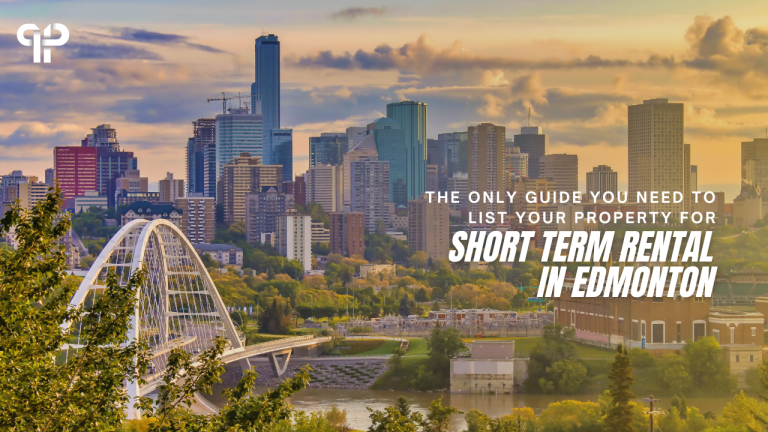Welcome to the promising world of short-term rentals in Edmonton—a city bustling with opportunities for homeowners looking to turn their properties into profitable ventures. As the popularity of travel experiences that offer a “home away from home” grows, platforms like Airbnb, VRBO, and others have transformed the way tourists and visitors seek accommodations. This shift offers an enticing opportunity for property owners to capitalize on their underutilized real estate by transforming them into welcoming spaces for guests from around the globe.
At Prowess Property, we understand that the journey from homeowner to host can be filled with questions and uncertainties. That’s why we’ve crafted this detailed guide: to navigate you through every step of the process. From understanding the types of rentals to navigating Edmonton’s specific legal landscape, and from optimizing your hosting responsibilities to mastering the art of guest relations, this guide will equip you with all the knowledge you need to succeed in the short-term rental market.

Understanding Types of Short-Term Rentals
Entire Dwelling Rentals
Renting out your entire home on platforms like Airbnb or Vrbo can be a lucrative venture, particularly during popular events or tourist seasons. Families and groups often seek rentals that offer a more personal and cohesive living space than hotels can provide. Here’s an expanded exploration of the pros and cons of renting out your entire home:
Pros:
- Higher earning potential: Renting out an entire home usually commands a higher nightly rate compared to renting out individual rooms. This is because guests have exclusive use of the entire space, giving them a sense of privacy and autonomy. During peak seasons or major events, the earning potential can be even greater due to increased demand.
- Increased privacy: For both the host and the guests, renting out the entire home offers a higher level of privacy. Hosts don’t have to share their living space with guests, while guests have the freedom to enjoy the property without the presence of other occupants. This added privacy can lead to a more relaxed and enjoyable experience for all parties involved.
- Flexibility in setting rates: When renting out the entire home, hosts have more control over setting their rates. They can adjust the nightly price based on factors such as seasonality, demand, and special events. This flexibility allows hosts to optimize their earnings and maximize their income potential.
Cons:
- Greater responsibility in maintenance and guest services: Renting out the entire home requires a higher level of commitment and responsibility from the host. Hosts are solely responsible for maintaining the property, including cleaning, repairs, and general upkeep. They also must provide excellent guest services, including responding to inquiries, coordinating check-in and check-out, and addressing any issues that may arise during the guests’ stay.
- Potential for longer vacancies between bookings: Depending on the location and the time of year, there may be periods when the property remains vacant between bookings. This can result in lost income and can be a challenge for hosts who rely on rental income to cover expenses. To mitigate this risk, hosts can implement strategic marketing techniques and offer competitive rates during off-peak seasons.
Overall, renting out your entire home can be a rewarding experience that offers the potential for significant earnings and increased privacy. However, it requires a high level of commitment and a willingness to take on the responsibilities of property management and guest services.
Individual Room or Shared Space Rentals
Opting to rent individual rooms or shared spaces in your residence can be a more manageable step into the world of short-term rentals, especially if you are new to the idea or still residing on the property. This arrangement allows you to be on-site to manage the rental actively and provides a more regular interaction with your guests, which can enhance the hosting experience and simplify management.
Pros:
- Constant Presence at the Property: Living on-site allows hosts to provide immediate assistance to guests and address any issues that may arise. This can lead to a more personalized and attentive guest experience, which can result in positive reviews and repeat bookings.
- Opportunities to Meet Diverse People: Hosting guests from different parts of the world and from different backgrounds can be a rewarding experience. Hosts get the chance to learn about new cultures, share their own experiences, and make lasting connections.
- Additional Income: Renting out a property as a short-term rental can be a significant source of income, especially in popular tourist destinations or during peak seasons. This can help hosts supplement their regular income or even become their primary source of income.
- Tax Benefits: In many countries, hosts of short-term rentals can deduct certain expenses, such as mortgage interest, property taxes, and depreciation, from their rental income. This can result in tax savings and make hosting more financially viable.
Cons:
- Reduced Privacy: Living on-site means that hosts will have less privacy compared to traditional landlords who live off-site. Guests will have access to shared spaces, such as the kitchen, living room, and bathroom, which can be challenging for hosts who value their privacy.
- Balancing Guest Interaction and Personal Life: It can be difficult to strike a balance between interacting with guests and maintaining a personal life. Hosts may feel pressured to be available to guests at all times, which can lead to burnout and resentment.
- Potential Legal and Regulatory Issues: Operating a short-term rental may be subject to local laws and regulations, such as zoning restrictions, licensing requirements, and taxes. Hosts need to be aware of and comply with these regulations to avoid legal issues.
- Maintenance and Repairs: Hosts are responsible for maintaining and repairing the property, which can involve time, effort, and financial resources. This can be especially challenging if the host does not have experience in property maintenance or if the property requires major repairs.

Legal Requirements and Application Process
Navigating the legal landscape is crucial for setting up your short-term rental in Edmonton. All short-term rental hosts are required to obtain a business license, which serves as a formal acknowledgment of your venture and ensures compliance with local laws and regulations.
Step-by-Step Guide to Obtaining a Business License:
Determine the Type of License Needed:
Before starting the application process, it’s crucial to identify the type of short-term rental license required. The type of license depends on the intended use of your property. Here are the two main license types:
- Entire Home Rental License: If you plan to rent out your entire home or property, you will need an entire home rental license. This type of license allows you to rent out your entire property for short-term stays, typically less than 30 days.
- Single Room Rental License: If you intend to rent out a single room or a portion of your home while you continue to occupy the rest of the property, you will require a single room rental license. This license allows you to rent out a specific room or space in your home for short-term stays.
It’s important to note that the requirements and regulations for each license type may vary, so it’s essential to research and understand the specific requirements for your intended use.
Once you have determined the type of license needed, you must gather all the necessary documents before starting the application process. The following documents are generally required:
- Property Details: Comprehensive information about your property, including the address, legal description, and proof of ownership.
- Operational Plan: A detailed operational plan outlining your intended use of the property, including the number of guests allowed, rental rates, and any additional services you plan to offer.
- Personal Identification: Proof of your identity, such as a government-issued ID, passport, or driver’s license.
- Other Required Documents: Depending on the specific requirements of your municipality or licensing authority, additional documents, such as insurance policies, background checks, or health and safety certificates, may be required.
It’s essential to ensure that all the documents are accurate, complete, and organized before submitting your application.
You can apply for a short-term rental license through the official website of your city or municipality or by mail. The online application process is generally straightforward and can be completed in a few steps. Here’s a general overview of the application process:
- Create an Account: If you’re applying online, you may need to create an account on the city’s website. This account will allow you to access and submit your application.
- Fill Out the Application: The application form typically includes questions about your property, intended use, contact information, and any required documentation. Make sure to provide accurate and complete information.
- Upload Required Documents: Attach all the necessary documents, such as property details, operational plan, and personal identification, in the designated sections of the application form.
- Review and Submit: Review your application thoroughly to ensure all the information is correct and complete. Once satisfied, submit the application electronically or by mail, depending on the preferred method.
After submitting your application, it will be reviewed by the licensing authority or municipality. The review process can take several weeks or months, depending on the specific regulations and workload. If your application is approved, you will be issued a short-term rental license that allows you to operate your rental property legally.
Operational Plan:
An operational plan is a crucial document that serves as a blueprint for managing your short-term rental. It should outline your strategies for handling various aspects of your business, including:
- Guest Communication: Establish clear and efficient communication channels for guests to inquire, book, and receive updates.
- Check-in and Check-out Process: Define the process for guests to check in and check out, including key exchange, arrival instructions, and checkout procedures.
- House Rules: Set clear expectations for guests regarding house rules, such as noise levels, smoking, and pet policies.
- Emergency Procedures: Develop a comprehensive emergency plan that includes contact information for local authorities, maintenance services, and a designated emergency contact person.
- Property Maintenance: Outline regular maintenance tasks and a schedule for inspections to ensure the property is well-maintained and safe for guests.
- Cleaning and Housekeeping: Establish a cleaning and housekeeping routine to keep the property clean and presentable for guests.
- Financial Management: Implement a system for tracking income, expenses, and taxes related to your short-term rental business.
Building and Fire Codes Compliance:
Ensuring your short-term rental property meets all safety standards is crucial for the well-being of your guests and your legal liabilities. Here are some essential considerations:
- Smoke Detectors and Carbon Monoxide Detectors: Install smoke detectors and carbon monoxide detectors in all sleeping areas and common spaces, as required by local regulations.
- Fire Extinguishers: Provide fire extinguishers in easily accessible locations throughout the property.
- Safe Exits: Ensure all bedrooms have at least two means of egress, such as doors or windows.
- Electrical and Plumbing Safety: Ensure electrical wiring, outlets, and plumbing fixtures are in good working order and meet safety standards.
- Local Codes and Regulations: Familiarize yourself with local building and fire codes and comply with any applicable requirements.
- Regular Inspections: Arrange for regular inspections by qualified professionals to ensure ongoing compliance with safety standards.
Common Pitfalls to Avoid:
- Underestimating Time Requirements: Many new hosts underestimate the time required to manage a short-term rental successfully. Tasks such as guest communication, cleaning, maintenance, and marketing can quickly add up. It’s essential to have a realistic understanding of the time commitment involved and allocate sufficient resources accordingly.
- Ignoring Community Rules: Always ensure your rental activities align with any homeowner association or community rules to avoid legal troubles. This includes obtaining necessary permits and licenses, adhering to noise ordinances, and following any restrictions on short-term rentals in your area.
- Lack of Marketing and Promotion: Marketing your short-term rental is essential to attract guests. Neglecting marketing efforts can result in low occupancy rates and lost revenue. Develop a comprehensive marketing strategy that utilizes various channels, such as online listing platforms, social media, and direct advertising.
- Poor Guest Communication: Effective communication is key to ensuring a positive guest experience. Respond to inquiries promptly, provide clear instructions and information, and be available to address any concerns or issues guests may encounter during their stay.
- Neglecting Maintenance and Upkeep: Regular maintenance and upkeep are crucial to keeping your property in good condition and attracting guests. Neglecting these tasks can lead to safety hazards, guest complaints, and a decline in your rental’s reputation.

Host Responsibilities
As a host, your role extends far beyond simply providing a space for your guests. Your responsibilities encompass creating a safe, clean, and welcoming environment that ensures a positive and memorable experience for your guests. Here are some key responsibilities you should prioritize as a host:
Safety and Security:
- Conduct regular checks and maintenance of safety equipment, such as fire extinguishers, smoke detectors, and first aid kits, to ensure they are in proper working condition.
- Clearly mark emergency exits with visible signage, maps, and instructions to guide guests in case of an emergency.
- Comply with all local safety regulations and obtain any necessary permits or licenses to operate your property as a vacation rental.
Communication and Transparency:
- Establish clear and continuous communication with your guests from the moment they book until they check out.
- Provide accurate and detailed information about your property, amenities, house rules, and local attractions to set expectations and avoid misunderstandings.
- Be responsive to inquiries, requests, and concerns promptly and professionally.
- Keep guests informed about any changes, updates, or issues related to their stay in a timely manner.
Property Maintenance and Cleanliness:
- Maintain the property in excellent condition by conducting regular cleaning, repairs, and maintenance.
- Ensure the property is well-stocked with essential supplies, including linens, towels, toiletries, kitchenware, and appliances, to meet the needs of your guests.
- Address any maintenance issues or damages promptly to prevent inconvenience to your guests and maintain the quality of your property.
Guest Satisfaction and Positive Reviews:
- Prioritize guest satisfaction by providing a comfortable, well-equipped, and inviting space for your guests.
- Encourage guests to leave reviews and feedback after their stay to gather valuable insights for continuous improvement.
- Respond to reviews, both positive and negative, in a professional and timely manner, thanking guests for their feedback and addressing any concerns.
Legal Compliance and Regulations:
- Familiarize yourself with and comply with all local, state, and federal laws, regulations, zoning requirements, and taxes applicable to vacation rentals in your area.
- Obtain any necessary permits, licenses, or registrations required to operate your property as a vacation rental.
- Keep up-to-date with any changes in regulations to ensure your property remains in compliance.
By fulfilling these responsibilities, you can create a safe, welcoming, and enjoyable environment for your guests, leading to positive reviews, repeat bookings, and a successful vacation rental business.

Tips for Being a Good HostEnhancing Guest Experience:
- Welcome Kit: Consider providing a welcome kit that includes snacks, local maps, and a guidebook with your recommendations for dining and attractions. This will help guests feel comfortable and informed about their stay.
- Personal Touches: Small touches like fresh flowers or a note can make a big difference in how guests perceive their stay. These gestures show that you care about their comfort and want them to have a memorable experience.
- Home Comforts: Stock the home with essential amenities like shampoo, conditioner, soap, and towels, as well as some basic cooking supplies. Providing these items will make guests feel more at home and reduce the need for them to bring their own.
- Local Recommendations: Share your favorite local restaurants, shops, and attractions with your guests. This will help them make the most of their time in the area and get a sense of the local culture.
- Cleanliness: Make sure the home is thoroughly cleaned and well-maintained before guests arrive. This will create a comfortable and hygienic environment for them to enjoy.
Effective Communication:
- Pre-Arrival Information: Send your guests detailed information about check-in procedures and house rules before they arrive. This will help them plan their trip and avoid any surprises.
- Availability: Make sure you are readily available or have someone who can respond promptly to any issues that arise during the stay. This will give guests peace of mind knowing that they can reach you if needed.
- Regular Check-ins: Check in with guests regularly during their stay to ensure that everything is going well and that they have everything they need. This will show that you are attentive and care about their experience.
- Feedback: Encourage guests to provide feedback on their stay. This will help you improve the guest experience and make your home a more desirable place to stay.

Conclusion
Listing your property for short-term rentals in Edmonton offers a unique opportunity to tap into the vibrant tourism market and generate a steady stream of income. By partnering with a professional vacation rental management company like Prowess Property, you can ensure a seamless and profitable experience. Our team of experts will guide you through every step of the process, from preparing your property to attract guests to providing exceptional guest service.
With Prowess Property, you can rest assured that your property will be well-maintained and your guests will have a memorable stay. We handle all aspects of property management, including marketing, reservations, cleaning, maintenance, and guest communication. This allows you to sit back and enjoy the financial rewards of your short-term rental investment without the hassle of day-to-day management.
In addition to the financial benefits, hosting short-term rentals can also be a rewarding experience. You’ll have the opportunity to meet people from all over the world and share your love of Edmonton with them. And with the flexibility of setting your own rates and availability, you can create a rental schedule that fits your lifestyle.
So, if you’re ready to embark on this exciting journey, we encourage you to contact Prowess Property today. With our expertise and dedication to excellence, we’ll help you achieve your short-term rental goals and make your property a success!


